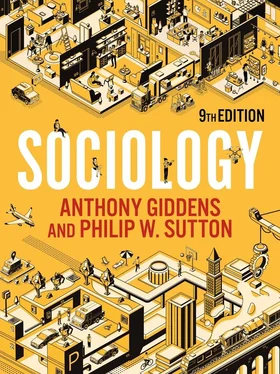Researching, writing and producing this book involves a creative collective of people, not just two authors. The customary caveat applies, however: all errors remain the responsibility of the authors. First thanks must go to all of those who reviewed the twenty-two chapters. Yet again, their critical, constructive comments have been an invaluable source of expert knowledge which helps to keep the book at the forefront of contemporary research and theory. We also thank the many lecturers and student readers of the previous edition, people who actually use the book and tell us about their experience and suggest possible improvements. It often seems that the book mediates between cutting-edge research and the teaching and learning process, which is exactly how it should be.
As ever, the Polity staff made the production process relatively painless. Special mention must go to Neil de Cort, Sarah Dobson and Breffni O’Connor, who took the book through production. We are very grateful for the painstaking work of Caroline Richmond, who never tires of pointing out our mistakes and inconsistencies, and always with good humour. As ever, our thanks to Jonathan Skerrett for his sound advice and good judgement on the big decisions. Finally, we thank Pat Sutton for more or less everything.
AG & PWS
As the academic discipline which studies and tries to make sense of societies and social life, sociology cannot stand still. It must move with society if it is to be relevant to contemporary issues and concerns. Failure to do so would lead to a reliance on outdated and inadequate accounts of the social world. One of our tasks is to provide explanations and frameworks that help everyone to understand the world they are helping to shape. This means that sociologists are always testing their cherished theories and perspectives against the evidence collected in research studies. If we find our theories are wanting, then we have to be prepared to modify them or, as often happens, devise new, more adequate ones. This helps to explain why theories in our discipline seem to change so often.
The ninth edition of Sociology has the same aim as the previous eight, namely to inspire a new generation of sociologists by introducing some of the most exciting research from across the discipline, from the environment, work, inequalities, and the media to war, health and gender issues. As ever, we have tried to avoid abstract discussion and the disciplinary jargon that we know readers find unnecessary. On the other hand, as a scientific subject, sociology does have its own technical language with which students need to become comfortable, and we aim to introduce this carefully and in accessible ways.
The chapters follow a sequence designed to help readers achieve a progressive mastery of the different fields of sociology, but there is also much cross-referencing, so chapters can be tackled as required. We also illustrate ideas, concepts and theories using real-world examples taken mainly from sociological studies. The combination of theory and evidence is, after all, one of the hallmarks of good sociology. Findings drawn from the cutting edge of the discipline are presented alongside contemporary events, issues and data, and we try hard to cover these in an even-handed, though not indiscriminate, way.
Sociology has a central place within the social sciences and a key role in modern intellectual life. Underpinning this book is our shared vision that a general sociological approach is still the best way of setting our personal life experience into a broader context, so we are better able to make sense of the connections between individuals and society.
The book consists of twenty-two chapters, and each deals with a specific field of study, but there are some key issues across the whole book. We have identified four themes – globalization, social inequality, the digital revolution and identity – that are significant in many areas of sociology today.
The concept of globalization has become common currency today, and chapter 4covers the subject in detail. Some have argued that the process of closer global integration has stalled or even gone into reverse, as evidenced by the increasing popularity of nationalism in the political sphere. Our assessment is that this is not correct. The globalization of social life has, of course, prompted opposition from several directions, while the supposed benefits of globalization have clearly not been favourable for everyone. But our view is that the balance of the evidence shows that the globalizing of human affairs continues, systematically binding the world’s societies more closely together, regardless of what we may think about it.
The 2008 financial crash and the 2019–20 Covid-19 pandemic demonstrated that we all share a global economic system and global transport infrastructure that link national economies together and facilitate the mass movement of people around the world. The globalization of social life is one clear illustration of the need for sociologists to maintain a focus on worldwide social, economic and political change.
Globalization in the ninth edition
It is not possible to cover every impact of globalization in one single chapter, chapter 4, ‘Globalization and Social Change’, but a quick reference guide to global issues and globalization will help to direct readers to relevant chapters:
Chapter 1, ‘What is Sociology?’ – introduction to globalization in sociology and the illustrative example of coffee
Chapter 3, ‘Theories and Perspectives’ – colonialism and its legacy, postcolonial theory and decolonizing sociology, cosmopolitanism and citizenship
Chapter 5, ‘The Environment’ – the global risk society, global warming, globalization of ecological modernization
Chapter 6, ‘Global Inequality’ – global inequality throughout, discourses and models of global inequality, global wealth distribution, unequal life chances in the Global South/North, global demographic trends, development theory and post-development critiques
Chapter 7, ‘Gender and Sexuality’ – global human trafficking and sex tourism, the global gender order, feminist movements and theories in the Global North/South, LGBTQ+ rights around the world
Chapter 8, ‘Race, Ethnicity and Migration’ – the global ‘age of migration’, colonialism and the slave trade, global diasporas
Chapter 9, ‘Stratification and Social Class’ – modern slavery, globalization and stratification systems
Chapter 10, ‘Health, Illness and Disability’ – disability in a global context, globalization and health pandemics
Chapter 11, ‘Poverty, Social Exclusion and Welfare’ – the precariat as a ‘global class’ in the making, welfare state reform under globalization
Chapter 13, ‘Cities and Urban Life’ – global cities within globalization, global gentrification, urban development in the Global South
Chapter 14, ‘The Life Course’ – global life expectancy, ageing around the world
Chapter 15, ‘Families and Intimate Relationships’ – globalizing family trends, families in a global context
Chapter 16, ‘Education’ – education in a global context, globalization and the e-university
Chapter 17, ‘Work and Employment’ – globalization of manufacturing, economic globalization
Chapter 19, ‘The Media’ – idea of the ‘global village’, global internet penetration and use, backlash against global communications, global music industry and digitization, media imperialism and resistance
Chapter 20, ‘Politics, Government and Social Movements’ – the global spread of democracy, prospects for global governance, anti-globalization movements, globalization and the social movement society
Читать дальше












